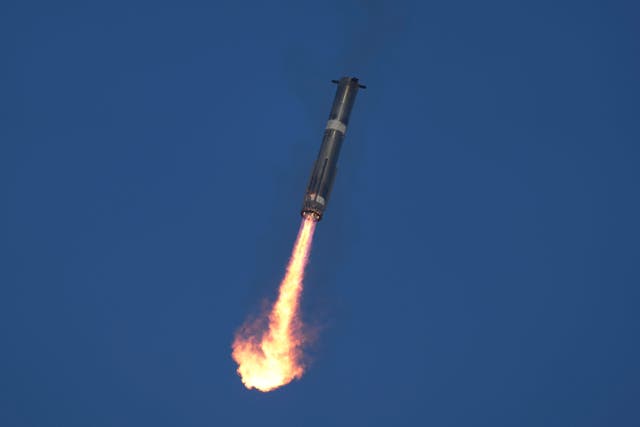SpaceX craft was destroyed by fire after fuel leak, tests suggest
The company has promised ‘a thorough investigation in coordination with the Federal Aviation Administration.

SpaceX suspects a fire may have caused its Starship to break apart during lift-off and send trails of flaming debris into the sea.
SpaceX boss Elon Musk said preliminary indications are that leaking fuel built up pressure in the cavity above the engine firewall, and the resulting fire destroyed the spacecraft.
On Friday, the company promised “a thorough investigation” in coordination with the Federal Aviation Administration.
The 400ft Starship — the world’s biggest and most powerful rocket — launched from the southern tip of Texas on a test flight early on Thursday evening.
The booster made it back to the pad for a catch by giant mechanical arms – only the second time in Starship history.
But the engines on the still ascending spacecraft shut down one by one, and communication was lost eight-and-a-half minutes into the flight.
Dramatic video taken near the Turks and Caicos Islands showed spacecraft debris raining down from the sky in a stream of fireballs. Flights near the falling debris had to be diverted.
SpaceX said that Starship remained in its designated launch corridor over the Gulf of Mexico and then the Atlantic. Any surviving wreckage would have fallen along that path over water, the company said on its website.
Starship had been aiming for a controlled entry over the Indian Ocean, halfway around the world. Ten dummy satellites, mimicking SpaceX’s Starlink internet satellites, were on board so the company could practise releasing them.

Mr Musk said on X the accident was “barely a bump in the road” in his plans to build a fleet of Starships to carry people to Mars.
Nasa has booked two Starships to land astronauts on the moon later this decade under its Artemis programme, the successor to Apollo.
“Spaceflight is not easy. It’s anything but routine,” Nasa administrator Bill Nelson posted on X after the accident. “That’s why these tests are so important.”
Earlier on Thursday, Jeff Bezos’s Blue Origin company also had mixed results with the debut of its massive New Glenn rocket.
It achieved orbit on its first try, putting a test satellite thousands of miles above Earth but the booster was destroyed after failing to land on a floating platform in the Atlantic.





